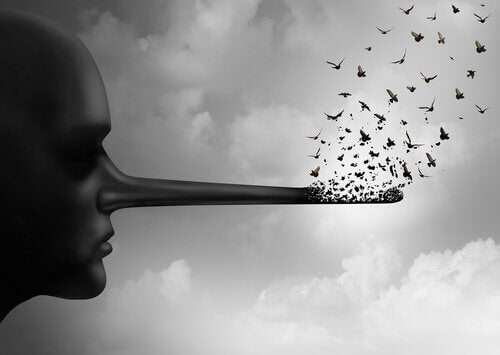You’ve probably wondered why we’re lying. In general, we lie for fear of the consequences of the spread of something: something we did, didn’t do, listen, see, talk, or know.
According to the Contemporary Dictionary of the Portuguese Language, lying is “to say or manifest the opposite of what is known, believed or thought”. Therefore, lying is the opposite expression or manifestation of what is known, believed, or thought.
- On the other hand.
- To deceive is to give the lie the appearance of truth or induce someone to take for granted what it is not.
- Using apparent or supposed words and constructions.
As we see, the lie refers to the question of whether the content of a message correctly reflects reality. Deception includes the key concept of intentionality or willpower.
As we said, we lie out of fear of consequences, we lie to blame another person, not to hold ourselves accountable, to hurt another person, or not to face our own problems or those of others.
We’re lying to hide something. We lie to avoid the shame we feel for what we have done and for its consequences.
However, when a lie is discovered, there can be negative consequences for the liar, and sometimes these consequences are even worse than those caused by the fact or information that the person has tried to hide.
We also lied to gain an advantage over someone else or to gain an advantage that we actually believe we can’t get. Lying and cheating are instruments for achieving goals. Lying is often an attempt to control and manipulate the behavior of others.
“Only women and doctors know how necessary and beneficial lying can be. “Anatole France.
We also lie for other reasons, varied and complex. Sometimes lying has a “positive” purpose: to help someone, as is the case with “altruistic lies. “We also lied to congratulate, encourage or try to make others happier.
Another reason we lie is not to harm others, to avoid personal or family conflicts, or not to thwart our own plans or projects or those of others. It’s common not to want friends or family to know anything negative about us or something. that can damage them.
In many cases there is a real and well-founded fear that family, friends and loved ones are suffering from something that happened, and because we don’t want to hurt these people, we try not to tell the truth.
On the other hand, lying can also be a simple and straightforward way to protect your privacy.
Liars almost always harbor a well-founded fear that truth will be made public; In addition, this feeling implies the fear of:
Most of the time, this fear may be justified in the short term, but not in the long term; over time, a lie is unlikely to withstand contrast with the facts or serve to achieve the intended goals. no, to keep a lie, we’re bound to keep lying.
Another fear as important or more important as the previous one is the fear of probable additional punishment if you discover the lie that purports to cover up the responsibility or guilt of yourself or another person. Sometimes what drives a person to continue their lie is not wanting them to find out they’re lying.
“It’s easier to catch a liar than a cripple. “-Anonymous-
We’re all more or less eager to make a good impression on others. When you want to save your skin at all costs, you can lie to present or maintain a good image of yourself.
As we’ve seen, we lie for a number of reasons. Behind all the lies, however, is the fear of consequences that we don’t want to happen.

